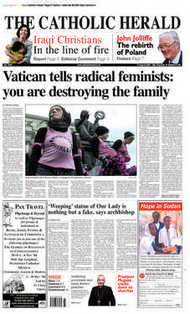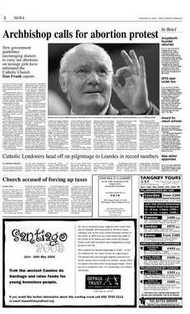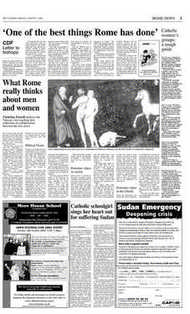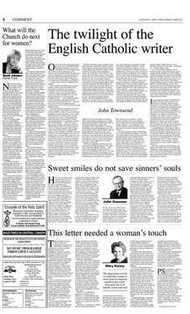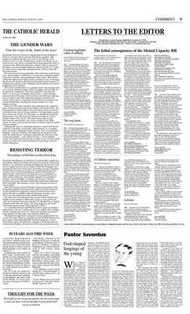Page 8, 6th August 2004
Page 8

Report an error
Noticed an error on this page?If you've noticed an error in this article please click here to report it.
Tags
Share
Related articles
Happy 75th Birthday, Your Eminence
`head Of Winchester?
Cardinal Pressured To Ease Support For Scots Independence
The Cardinal Comes Out Fighting
The Right Reform
The twilight of the English Catholic writer
John Townsend
One of the more interesting things to come out of Cardinal Cormac Murphy-O’Connor’s controversial interview in The Independent last week was his puzzlement at the absence of prominent Catholic laymen and women. Speaking of the pressing need to open the debate about the future of the Church in Britain, he asked: “Where are our modern-day Chestertons and Bellocs? ... I want to hear from our intelligent lay people.” The Cardinal’s bewilderment certainly strikes a chord. Since the death of the elder Duke of Norfolk, prominent Catholics, and particularly prominent Catholic writers, seem to have taken a back seat in British public life. It is not simply that there is a lack of good Catholic writers — look within the pages of this newspaper and other Catholic publications to dispel that idea — but that they seem to lack the public ear and commercial success of G K Chesterton and Hilaire Belloc.
What the Cardinal overlooks, however, is that Chesterton and Belloc were not simply Catholic writers. It is true that their pamphlets on faith and ethics were widely read. Chesterton’s robust public oratory would attract crowds of thousands. But although rightly remembered as being among the greatest of the literary champions of Christianity — with C S Lewis they did not simply write about religion. Hilaire Belloc achieved lasting fame as a writer of children’s poetry with a darkly comic didacticism. Who can forget the hideous ends of Belloc’s children? Jim, the little boy who kept running away from his parents and was eventually eaten by a lion, or Matilda, who lied so much that no one would believe her when she saw that the theatre was on fire, and who thus burned to a crisp. Chesterton himself was a bestselling crime writer, a friend of Agatha Christie and Dorothy Sayers whose clerical sleuth Father Brown solved the imaginary crimes of polite London society. In addition, Chesterton wrote numerous novels, acclaimed biographies of Dickens and William Blake, and a history of England. But the Cardinal is right to make it clear that Chesterton and Belloc held the public ear on matters of faith and religion. These were emphatically Christian writers. There can be no division of their published works into “religious” and “secular” categories. Today, Catholic writers seem to be forced into just such a distinction. Graham Greene was the last Catholic writer to truly enjoy a level of celebrity and success comparable to Chesterton and Belloc; and, after him, perhaps only Brian Moore. If Catholic writers are successful today, it is often in spite of their Catholicism. More traditionally minded Catholic writers find it particularly difficult to enjoy widespread appeal in other genres. Witness the fate of Ann Widdecombe’s first novel The Clematis Tree, a rather moving tale of one family’s life with a disabled child: it enjoyed a very brief flurry of sales as her first novel and then bombed. Consider the plight of Catholic historians and theologians who regularly publish good, intelligent books on British Catholicism, only to see them languishing, lonely and unbought, in the “spirituality” section of bookshops amid self-help guides and The Tao of Piglet. Irish Catholic books, such as Frank McCourt’s Angela’s Ashes, and Roddy Doyle’s Paddy Clark, Ha Ha Ha, continue to have good sales; but the attraction seems to lie more in the dissection of Irish popular culture in the vein of James Joyce than in the specifically Catholic elements of Irish life.
What has happened to the literary and cultural life of Catholic Britain? The dilution of British Catholic identity — and particularly English Catholic identity may have something to do with it. At some undefined point in the mid-Eighties, the Catholic Church became part of the British establishment. In the space of a genera tion, the distinctive constituency which Chesterton and Belloc spoke to simply melted away. Being a Catholic was no longer something to be whispered about in hushed tones; no longer a cool, alternative lifestyle which sustained its own counterculture. The fortress Catholicism so familiar to converts such as G K Chesterton and Evelyn Waugh was no more.
What caused this change? Clearly, the liturgical changes of Vatican II and the abandoning of the Latin Mass played their part. Of perhaps greater importance was Cardinal Murphy-O’Connor’s predecessor at Westminster — the strong and wise figure of Cardinal Basil Hume. Hume was a Churchman who enjoyed a public eminence not seen since the days of the convert cardinals Newman and Manning, and he did more than any other person to hasten the acceptance of Catholics into the very highest echelon of the establishment.
His widely mourned death, and the Queen’s fondness for “my Cardinal” even to the extent of awarding him the Order of Merit — is testament to the ending of the tradition of distrust and persecution towards Catholics in British society.
Yet with acceptance came compromise. It is ironic that Cardinal Hume, who studied at both Oxford and Freiburg, may have precipitated the repositioning of the Church within society, which ended a definitively Catholic literary life. One reason why there are no Chestertons or Bellocs these days may be because Catholics no longer need them. In an age of material plenty and spiritual uncertainty, they can look to the Chief Rabbi or the Dalai Lama, or to the numerous selfhelp books by New Age gurus, or increasingly to the foolish television personalities who occupy the hinterland of postmodern popular ethics: Oprah Winfrey, Jerry Springer, Montel, Trisha, and — God help us — Robert Kilroy-Silk.
Our current Prime Minister and his family are the living embodiment of this compromised Catholicism. Cherie Blair, a Catholic woman who married an establishment non-Catholic barrister, criticises the Pope for not allowing women more say in the running of the Church. Tony Blair himself, although not a Catholic, had to be told by Cardinal Hume to desist from taking Communion in Westminster Cathedral with the rest of the family. With the acceptance of Catholicism has come a blurring of the spiritual boundaries. This in turn has marginalised Catholic writers who would seek to follow the tradition of Chesterton and Belloc.
It is certainly true that Chesterton and Belloc did not simply speak to the Catholics of Britain. Much of their appeal lay in the fact that they sought to rise above denominational differences and speak to men and women as Christians. But what made Chesterton and Belloc so successful was the fact that they did so as Catholics. In a nation in which being Catholic was a public issue in a way it is not today, they stood out for creating an unusual frisson with their Catholic perspective. Today, the same frisson is generated by New Age writers. Then it was generated by the fact that the Catholic Church was outcast in British society.
Cardinal Murphy-O’Connor is right to lament the passing of their influence, but not the circumstances that gave rise to it. Living the Catholic faith in Britain today is a positive and accepted part of British life, which is something that all Christians should be grateful for. These changed times require a new message, and new communicators will no doubt emerge to deliver it.
The robust rhetoric of Chesterton and Belloc has sadly had its day. Perhaps the Cardinal can take solace in the blissfully blunt words of the Philosopher of Ecclesiastes: “Do not ask why the past was better than the present, for this is not a question prompted by wisdom.”
blog comments powered by Disqus


